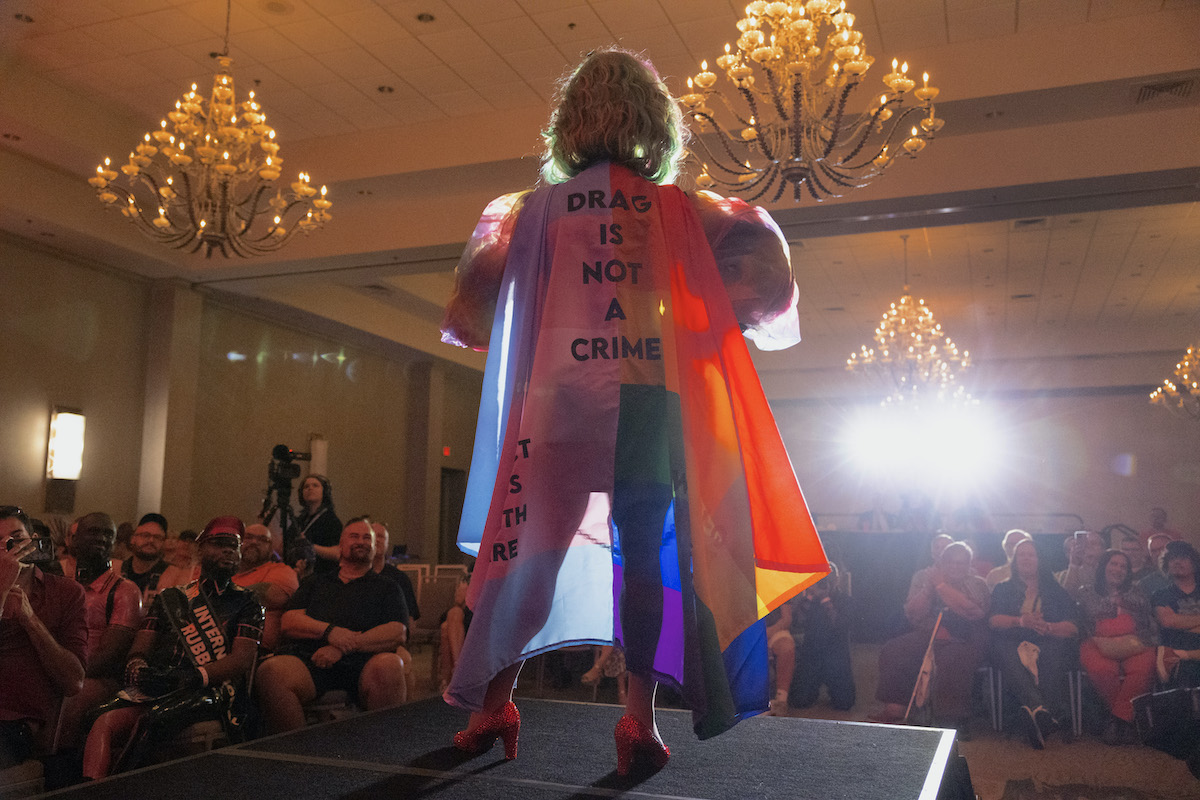This week, the fight for LGBTQ+ rights found a surprising ally in the Supreme Court, which said that Ron DeSantis’ Florida drag ban could not be enforced during the appeals process.
First, some background. Hamburger Mary’s in Orlando, a burger bar known for its drag shows, filed a lawsuit earlier this year saying DeSantis’ drag ban violated their right to free speech and interfered with their business. In June, a U.S. judge sided with Hamburger Mary’s, saying the law banning minors from “obscene live performances” was too broad. Judge Gregory Presnell also noted that “Florida already has statutes that provide such protection. Rather, this statute is specifically designed to suppress the speech of drag queen performers.”
Presnell did not go so far as to entirely overturn the ban, though. Instead, he issued an injunction blocking it from being enforced while the lawsuits proceed. What Florida was asking was for the Supreme Court to say they could enforce the ban during the ongoing appeals process. And thankfully, the Supreme Court said no.
What did the Supreme Court actually say about Florida’s anti-drag law?
The Supreme Court’s refusal to block the ban was not actually an official decision on the case itself. They simply stated that they would not issue a stay of the lower court’s judgement during appeals, meaning Presnell’s decision to block enforcement would remain in place for now.
Brett Kavanaugh wrote the official statement and Amy Coney Barrett signed off on most of it. (Clarence Thomas, Sam Alito, and Neil Gorsuch dissented but didn’t elaborate as to why. The other justices didn’t weigh in one way or the other) But before you start thinking these two right-wing extremists have suddenly decided to trot on over to the right side of history, temper those expectations a bit.
Unsurprisingly, Kavanaugh and Barrett do not make the argument that Florida’s ban is unconstitutional (or stupid or bigoted or anything else). No, this is more of a procedural nitpicking.
Basically, Florida’s laws are sloppy. This is presumably part incompetence and part deliberate maliciousness. Florida and other ban-happy states like Texas use extremely vague language in their laws related to things like abortion, drag, and trans rights because it makes them really hard to challege, and those worried about violating them tend to be overly cautious, making them even more restrictive than they might be with clearer boundaries. (Case in point: This Florida drag ban doesn’t actually use the word “drag,” but bars “obscene” performances for children that include exposure to “prosthetic genitals and breasts” or otherwise offend non-defined “prevailing standards in the adult community.” This serves to bring all drag performaces and even, potentially, the act of existing while queer or tans, under the umbrella of obscenity.)
But it looks like Florida’s appeals are also sloppy, and that isn’t working as well for them. Kavanaugh writes:
To begin with, although Florida strongly disagrees with the District Court’s First Amendment analysis, Florida’s stay application to this Court does not raise that First Amendment issue. Therefore, the Court’s denial of the stay indicates nothing about our view on whether Florida’s new law violates the First Amendment.
In short: “If you want us to say this ban is constitutional, then you have to, like, mention the Constitution in your request.” This is basic stuff.
What this means moving forward
In his statement, Kavanaugh also seemed interested in taking up the larger issue of whether courts can block the government from enforcing these laws while they’re working their ways through the courts, especially as they apply to people and groups that aren’t directly involved in the lawsuit.
He specifically says there’s no federal statute on the books giving district courts that power and seems stoked to circle back to the issue in the future. This case, he writes, is just “an imperfect vehicle” for addressing that question.
Not to be a total downer but this is terrifying. Just as one important example, we’ve seen abortion bans be challenged by advocacy groups and activists in states across the country, and a lot of those bans have been ruled unenforcable while they’re being considered by the courts. This has been a literal lifesaver for countless women and pregnant people since the overturn of Roe v. Wade. I would not put it past this right-wing extemist court to be the ones to put an end to it.
Still, the Supreme Court had an opportunity to let Florida run wild with its draconian ban and they didn’t. Hamburger Mary’s and other drag venues can continue to delight Floridians for the time being. That’s a win in my book, no question.
(featured image: Joe Raedle/Getty Images)










Published: Nov 17, 2023 06:02 pm